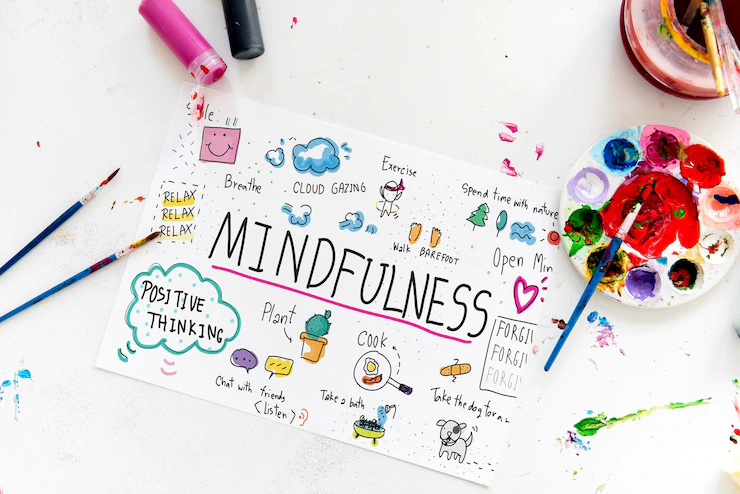In today’s fast-paced and demanding world, anxiety has become a prevalent issue affecting many individuals. The constant stream of information, high expectations, and the pressures of daily life can take a toll on our mental well-being. However, one effective approach to managing anxiety and promoting overall mental health is through the practice of mindfulness. In this article, we will explore the concept of mindfulness and discuss how it can help reduce anxiety and improve overall mental well-being.
What is Mindfulness?
Mindfulness is a practice rooted in ancient Eastern philosophies that has gained widespread recognition in recent years. It involves bringing one’s attention to the present moment, without judgment or attachment to thoughts or feelings. Mindfulness is about being fully present and aware of our experiences, both internal and external, with an attitude of openness and acceptance.
Reducing Anxiety through Mindfulness:
- Cultivating Self-Awareness: Mindfulness helps develop a deeper understanding of our thoughts, emotions, and physical sensations. By becoming aware of our anxiety triggers and patterns, we can respond to them more effectively. Mindfulness allows us to observe our anxious thoughts without judgment, enabling us to gain a greater sense of control over our responses.
- Managing Racing Thoughts: Anxiety often comes with a racing mind, filled with worries and intrusive thoughts. Mindfulness helps us acknowledge these thoughts without getting entangled in them. By observing our thoughts non-judgmentally and allowing them to come and go, we can prevent them from spiraling out of control and reduce their impact on our well-being.
- Grounding in the Present Moment: Anxiety is often fueled by concerns about the future or dwelling on past events. Mindfulness anchors us in the present moment, bringing our attention to the here and now. By focusing on our breath, bodily sensations, or the sights and sounds around us, we can shift our attention away from anxious thoughts and find a sense of calm and stability.
- Acceptance and Non-Judgment: Mindfulness involves accepting our experiences as they are, without judgment or resistance. Instead of trying to suppress or control our anxiety, we acknowledge and accept it with compassion and curiosity. This non-judgmental stance allows us to create a healthier relationship with our anxiety and reduces the additional stress caused by self-criticism or self-judgment.
- Developing Emotional Resilience: Regular mindfulness practice can help build emotional resilience, enabling us to navigate difficult emotions, including anxiety, more effectively. By observing our emotions without immediate reactivity, we develop the capacity to respond thoughtfully rather than impulsively. This resilience allows us to face anxiety with greater calm and equanimity.
- Stress Reduction and Relaxation: Mindfulness techniques, such as deep breathing exercises or body scan meditations, can activate the body’s relaxation response. These practices help calm the nervous system, lower heart rate, and reduce muscle tension. Regular mindfulness practice enhances our ability to manage stress and promotes a sense of overall relaxation and well-being.
- Enhancing Self-Care: Mindfulness encourages self-care by promoting self-awareness and self-compassion. By nurturing a kind and non-judgmental attitude toward ourselves, we become more attuned to our needs. We learn to prioritize self-care activities that nourish our mental and emotional well-being, such as adequate rest, healthy eating, engaging in hobbies, and fostering positive relationships.
Getting Started with Mindfulness:
- Start small: Begin with short periods of mindfulness practice, gradually increasing the duration over time. Even a few minutes of daily practice can yield significant benefits.
- Incorporate mindfulness into daily activities: You don’t have to set aside dedicated time for mindfulness practice only. Infuse mindfulness into your everyday life by bringing awareness to routine activities such as eating, walking, or washing dishes.
- Explore guided meditations or mindfulness apps: There are numerous guided meditation resources and smartphone apps available that can support your mindfulness journey. These provide structured guidance and help you establish a regular practice.
- Join a mindfulness group or class: Consider joining a local mindfulness group or enrolling in a mindfulness-based program or class. Learning alongside others and receiving guidance from experienced teachers can deepen your understanding and commitment to the practice.
- Be patient and gentle with yourself: Mindfulness is a skill that takes time to develop. Approach your practice with patience, kindness, and a non-judgmental attitude. Embrace the journey and allow yourself to grow at your own pace.
Mindfulness is a powerful tool for anxiety reduction and improved mental health. By incorporating mindfulness into our daily lives, we can cultivate a greater sense of calm, resilience, and well-being. Begin your mindfulness journey today and experience the transformative benefits it can bring to your life.










